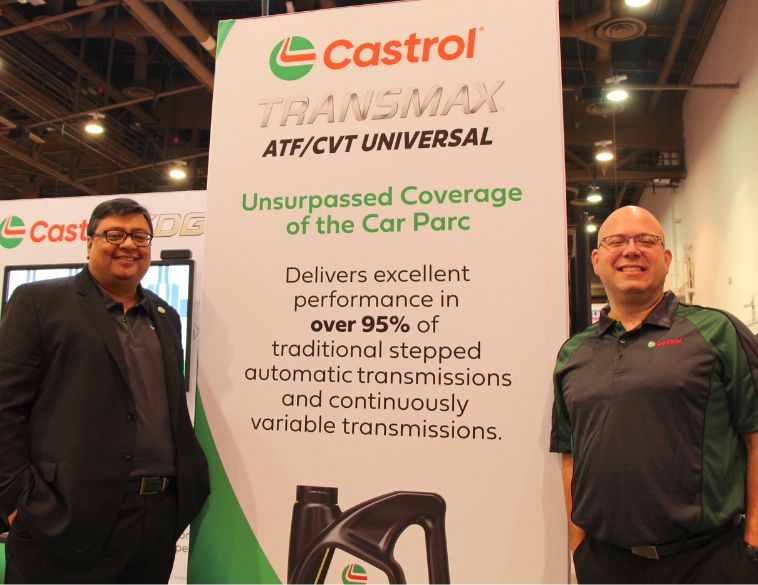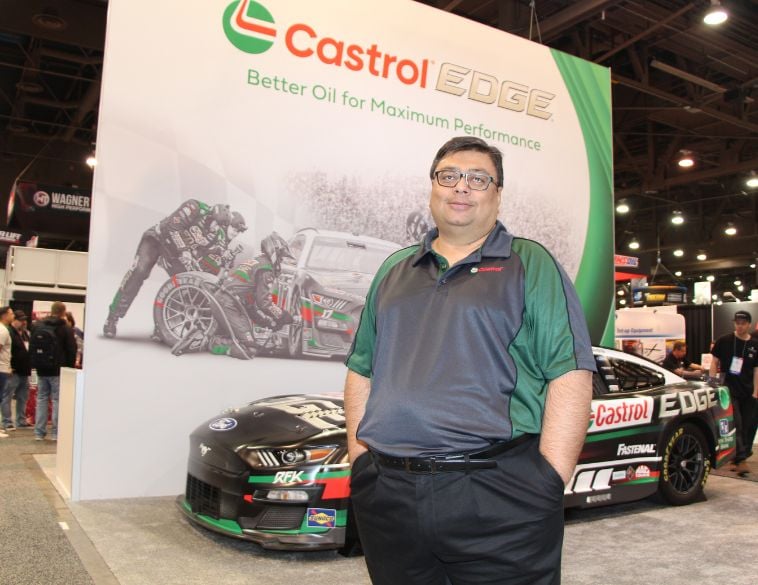Wakefield Canada and Castrol reimagine iconic logo alongside expanding product portfolio.
Wakefield Canada, which manufactures and distributes Castrol branded products in Canada, has announced some major changes going into 2024. A key one is an update of the famous Castrol logo on all products sold under this storied brand name.
“Castrol, as a brand dates back 124 years,” explains Hasan Zobairi, Vice President, Marketing Castrol – Wakefield Canada, “and has long been recognized as a pioneer in the lubricants space, with a legacy of enabling land-speed records and more recently, innovating to pro- duce Castrol grease that lubricated NASA’s Curiosity rover.”
Changing dynamics
The updated branding was first announced in early 2023 and now it’s coming to the U.S. and Canada, with an official statement declaring that the brand refresh is aimed at, “better reflecting Castrol’s position in the market, especially given the changing dynamics of the automotive industry,” including the proliferation of hybrids and electric vehicles (EVs).
“It reflects the changes taking place in mobility,” Zobairi explains. “Today, customer needs and requirements are changing faster than ever. They’re becoming more diverse and that’s reflected in the growth in demand for lower viscosity oils and EV transmission fluids.”
Zobairi points to the growth in hybrids within the Canadian marketplace as a clear example of changing market dynamics and how Wakefield Canada is responding to customer demands. A good example is Castrol HYSPEC. HYSPEC represents Castrol’s new benchmark standard for hybrid engine oils and is the result of extensive R&D and real-world testing, with more than two billion pieces of data, as well as input from vehicle OEMs and motorsport entities.
Zobairi notes that hybrid engines tend to operate at 40% lower temperatures than conventional passenger car ICE units and are often in use for shorter cycles since the hybrid regularly shifts from gasoline to electric power and vice versa. And because they can experience up to 10 times greater start/stop cycles, the potential for excessive friction and wear, as well as contamination and corrosion (because extra heat does not allow water and other contaminants to evaporate) is far greater than with a traditional engine. That’s why it’s imperative in today’s changing car parc to use high-quality motor oils like Castrol EDGE & Magnatec that are tested across a wide array of engine types to ensure optimum reliability, as well as performance.
Castrol’s Magnatec and EDGE brands will now include the HYSPEC call-out, reassuring customers that Castrol oils will continue to outperform market standards in both traditional ICE cars and trucks, as well as the latest hybrid vehicles on Canadian roads today.

EV specific fluids
Alongside Castrol HYSPEC, the company has added a range of electric vehicle-specific fluids under the Castrol ON brand. These include Advanced Transmission, Thermal Management and Grease EV fluids.
With range continuing to be a key criterion for consumers considering EV purchases, anything that can improve driveline efficiency is seen as adding considerable benefits and accelerating EV adoption. Castrol ON Transmission fluids are designed to reduce energy loss in EV drive-trains and by doing so, improve transmission efficiency, which contributes to more performance and greater range.
Besides the introduction of these new fluids for new and evolving segments, Wakefield Canada and Castrol continue to innovate for the more traditional internal combustion engine vehicles. Even here, engineering and technology continue to evolve.
As Zobairi explains, there’s been significant growth in demand for lower viscosity motor oils as OEMs seek to bring maximum efficiency from internal combustion engines, including ever tighter tolerances, different metallurgy, more advanced fuel delivery, operating parameters (including valve timing), plus power adders, such as turbochargers, to gain more performance from less displacement. This has led to unique formulations and oil specifications which Wakefield Canada continues to bring the latest Castrol innovations to Canadian motorists.
CVT solutions
Besides engine oils, Castrol has also been adapting to changing transmission fluid requirements, including the proliferation of Continuously Variable Transmissions (CVTs) in passenger cars and light
trucks/SUVs, ensuring smooth gearshifts and prolonged transmission life. Today, via Wakefield Canada, Castrol Transmax Universal covers 95% of stepped automatic transmissions and CVTs on Canadian roads.
This broad scope of vehicle applications improves workshop efficiency and inventory management, helping customers simplify a complex category, notes Zobairi. “We’ve seen great performance with TRANSMAX Universal,” explains Donny Braga, Brand Marketing Manager, Castrol.
“We’ve seen service technicians and workshops respond really well to it, and we’ll be continuing to expand our presence in this segment.”
Besides these segments, Castrol also offers formulations designed for classic car engines, as well as motorcycles— ensuring virtually every base is covered. If it has moving parts, Wakefield Canada and Castrol have a lubricant solution for it.
Tying all this back to the updated brand messaging built around the concept of “The Path Forward,” for Wakefield Canada and Castrol, it’s about being the complete lubricant solution today and tomorrow. And given how 2023 has shaped up to be a pivotal year for the automotive industry—in terms of leaving the COVID-19 pandemic era behind and beginning a new chapter in the automotive industry, it seems the perfect time for an iconic brand like Castrol, to reset it’s vision for the future.
Extensive process
In a nutshell, the new logo and brand identity for Castrol are the result of an extensive brand strategy process, which included research, analysis and input from stakeholders, as well as industry specialists and customers.
We have a goal of continuing to increase market share–strategically— but that means focusing on creating value and differentiating ourselves.”
— Hasan Zobairi, Vice President, Marketing Castrol, Wakefield Canada
“The red path that goes through the logo,” explains Braga, “represents a symbol of three key messages—onward, upward, and forward.” His words are echoed by a statement from Castrol’s global CEO Michelle Jou: “I believe that refreshing a globally recognized brand is not just about changing its appearance or messaging—it’s about reinvigorating its essence and relevance in today’s world.” In other words, to be constantly dynamic and evolving to meet the needs of its customers—a strategic imperative that drives long-term growth, differentiation in the marketplace and ultimately, success.



